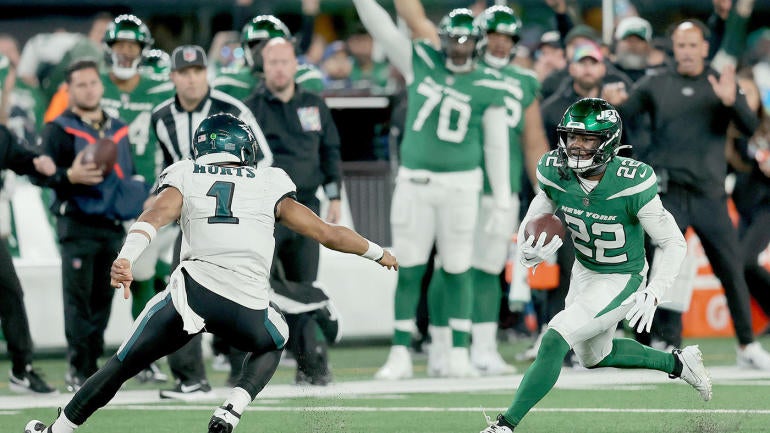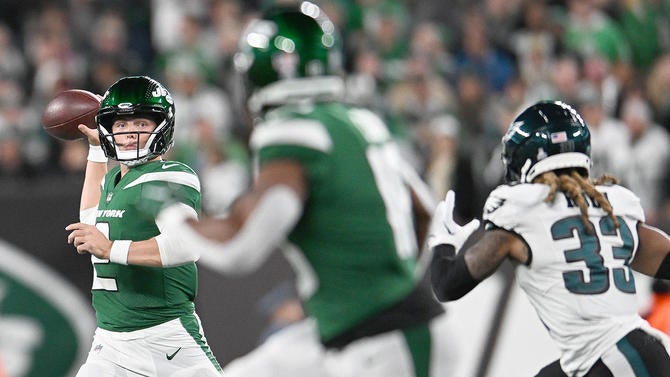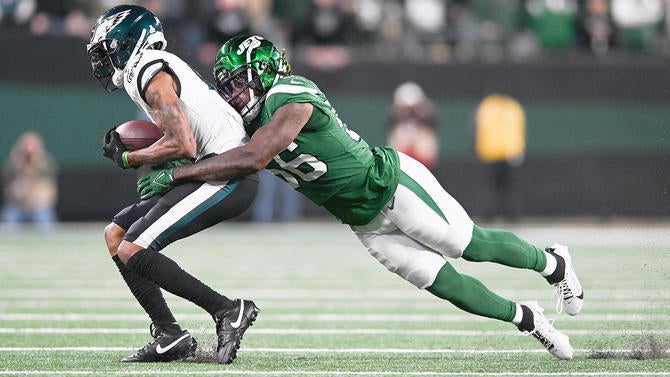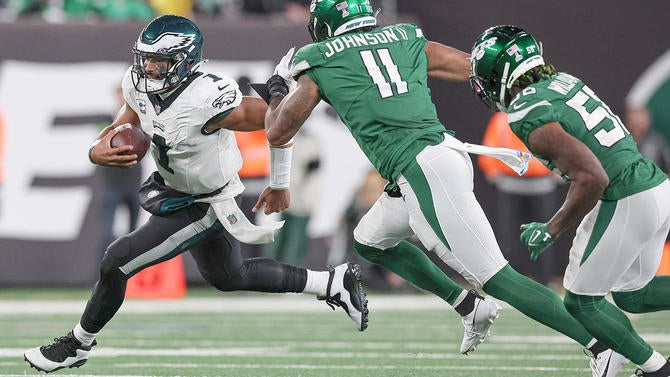
The Jets were touchdown underdogs in their own stadium on Sunday, matched up with the reigning NFC champion Eagles and down both starting cornerbacks, not to mention the vigorously rehabbing Aaron Rodgers. Yet New York came away with the 20-14 victory, handing Philadelphia its first loss of the 2023 season to improve to 3-3 in a competitive AFC East. It also marks the Jets first career win over the Eagles in 12 tries.
You might be wondering: How? How on Earth could the Zach Wilson-led Jets ensure the fall of this year's last unbeaten team?
We're glad you asked. Here are the three biggest reasons why New York pulled off the upset:
1. Zach Wilson controlled the ball

Wilson's numbers remained paltry -- he finished under 200 passing yards for the fifth time in six weeks -- but behind a still-shoddy line that surrendered five sacks, the third-year fill-in did nothing to gift wrap the game in Philly's favor. That may be a low bar to clear, but again, considering his protection up front (or lack thereof) and previous penchant for forced throws, the former first-rounder was helpfully conservative on a day Robert Saleh's defense controlled the contest.
He often failed to capitalize on that unit's takeaways, yes, but he also fed Garrett Wilson for some key gains and, again, never put the "D" in a position to surrender the game. Is this kind of quarterbacking sustainable for an aspiring contender? Perhaps not. But Wilson's composure against the Eagles' own legit defense was a clear contributor to Sunday's surprising result.
2. Robert Saleh's defense attacked the ball

This isn't anything new for a Jets unit that's surrendered fewer than 20 points per game despite already playing the Bills, Chiefs and Cowboys. But, boy, did Saleh have his defenders at peak physicality on a day where both Sauce Gardner and D.J. Reed were missing from the vaunted secondary. The Eagles didn't exactly commit to the run, but when they did give D'Andre Swift opportunities, New York's front was quick to swarm, limiting the explosive back to just 18 yards on 10 carries.
Even more than that, Saleh's group was proactive against the pass, closing gaps in a hurry so as to be in position for any possible takeaways. Eagles QB Jalen Hurts' first two picks were prime examples; a quick dump-off to tight end Dallas Goedert was lodged out by Jermaine Johnson and promptly caught by Quinnen Williams of all defenders, while Johnson's hit on Hurts' arm in the pocket made things easy for Bryce Hall on the second interception. C.J. Mosley showed textbook "punching" while forcing a Swift fumble in between the picks, never allowing the Eagles to get comfortable with the ball in their hands.
3. Jalen Hurts really felt the pressure

One of Hurts' best attributes during a 2022 MVP bid was his unfazed pocket poise. But the Pro Bowler has been a bit more erratic with his movement and decision-making this year, and that was never more apparent than against the Jets' front. For most of the first three quarters, he helped elevate an offense struggling to find a rhythm. In the final 15 minutes, he gradually became part of the problem, delaying a throw on his second pick, forcing one on his third (and ugliest) pick, and nearly tossing at least two more while pressing to move the chains and either preserve or retake the lead in the closing minutes.
It didn't help that right tackle Lane Johnson was missing for a lot of the action, and that the Eagles did little to help fill-in Jack Driscoll on the edge. Or that offensive coordinator Brian Johnson shied away from the run late. But Hurts is above the kind of back-foot throw that led to his game-altering pick to Tony Adams. His more frenzied footwork on such passes was a fairly clear result of the Jets getting consistent push up front, prompting Hurts to shift around -- and out of -- the pocket even when he didn't need to.

















